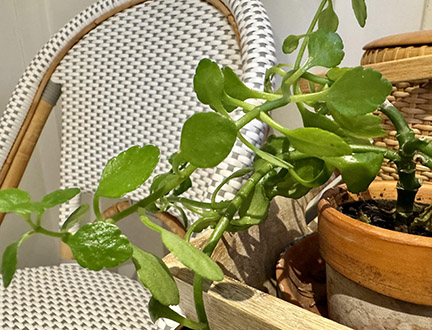 Words are strange beasts. Take ‘jade’ for example. It can refer to a brilliant green gem or stone, revered in China for its durability as well as its propensity to bring good luck. Or it might refer to the jade plant, flora’s manifestation of fortitude and fortune. Go to any Chinese restaurant worth its MSG and I bet you’ll find a jade plant somewhere near the cash register. Now consider jade’s adjectival form, ‘jaded.’ Its connotation is almost the exact opposite of its plant or mineral cousin. To be ‘jaded’ means you’re tired, played-out, disillusioned or cynical, as in, (just for example), “the public has become jaded by all the political shenanigans taking place in Washington these days.”
Words are strange beasts. Take ‘jade’ for example. It can refer to a brilliant green gem or stone, revered in China for its durability as well as its propensity to bring good luck. Or it might refer to the jade plant, flora’s manifestation of fortitude and fortune. Go to any Chinese restaurant worth its MSG and I bet you’ll find a jade plant somewhere near the cash register. Now consider jade’s adjectival form, ‘jaded.’ Its connotation is almost the exact opposite of its plant or mineral cousin. To be ‘jaded’ means you’re tired, played-out, disillusioned or cynical, as in, (just for example), “the public has become jaded by all the political shenanigans taking place in Washington these days.”
Etymology is the study of the origin of words and the way in which their meanings have changed over time. I mused (of course, I did) about how ‘jade,’ durable and lucky jade, had morphed into ‘jaded,’ it’s worn down, disinterested, unenthusiastic, “I’ve-seen-this-all-before” cousin. As it usually does, a little research went a long way, and it turns out that back in the day, a ‘jade’ was another name for a tired, old horse. Now we were getting somewhere: to be ‘jaded’ was to be a tired old horse, in other words, a nag ready for the glue factory.
Since I’m feeling a bit jaded these days, that thought made me shudder. Am I ready for the glue factory? I sure hope not! Maybe I’m just overexposed to all the consternation, confusion, and chaos emanating from Washington these days. I listen to the news and sigh; I roll my eyes, shake my head, and think, “How much longer, Lord? I’ve experienced too much of this already and it’s only March! I don’t know if I can take another forty months of this wilderness.”
I doubt I’m alone in this. I also recognize that many other of my fellow-Americans aren’t the least bit jaded. In fact, they’re feeling energized, glad to be back in the driver’s seat, finally getting rid of all this governmental waste and left-wing tomfoolery once and for all. And that thought makes me feel all the more…jaded. Sigh.
I have a lot of friends who have opted out of paying attention to the news. I understand that. But then an image pops into my mind—an ostrich with its head in the sand—and I know from experience that ignoring a problem doesn’t make it go away. Better to seek and find a solution and figure out how to prevent it from happening again. Simple enough for some of life’s travesties, much harder for others.
It turns out that an ostrich never really puts its head in the sand. That’s a myth. Think about it: if ostriches really did stick their heads in the sand to avoid imminent danger, there wouldn’t be any ostriches walking around today. I assume the same can be said for people. It’s far better to look around and see what’s really happening than to pretend that everything will be hunky-dory when I take my head out of this hole.
A year ago—maybe more—a friend gifted me a jade plant. Maybe she thought it would bring me luck or maybe she thought I looked a little jaded. I didn’t pay much attention to the plant for several months, but then I began to tend it and now it’s thriving. In fact, It’s going to need a bigger pot soon. So maybe I’m not so jaded after all.
I’ll be right back.
Jamie Kirkpatrick is a writer and photographer who lives in Chestertown. His work has appeared in the Washington Post, the Baltimore Sun, the Philadelphia Inquirer, the Pittsburgh Post-Gazette, the Washington College Alumni Magazine, and American Cowboy Magazine. His most recent novel, “The Tales of Bismuth; Dispatches from Palestine, 1945-1948” explores the origins of the Arab-Israeli conflict. It is available on Amazon and in local bookstores.



Write a Letter to the Editor on this Article
We encourage readers to offer their point of view on this article by submitting the following form. Editing is sometimes necessary and is done at the discretion of the editorial staff.